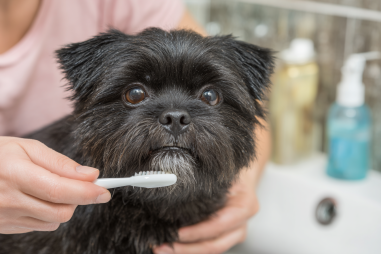Affenpinschers are charming, energetic little dogs often admired for their curious expressions and lively personalities. However, like all breeds, they have their own set of health concerns owners should know about to keep these adorable companions happy and thriving. Understanding common Affenpinscher health issues, recognizing early symptoms, and taking preventive measures can make a significant difference in your pup’s wellbeing and quality of life.
Introduction to Breed-Specific Health Risks
Every dog breed has unique genetic traits that may predispose them to particular health problems, and Affenpinschers are no exception. This small breed, known as the “monkey terrier” for their mischievous and intelligent nature, can be prone to some hereditary and chronic conditions that require attention. Being aware of these risks helps owners provide targeted care and avoid potential complications. From dental challenges to joint disorders, Affenpinschers have specific vulnerabilities that should be monitored closely.
Common Genetic and Chronic Conditions
Among Affenpinschers, several health issues tend to appear more frequently due to their genetic background. Some of the most common conditions include:
- Hip Dysplasia: This is a malformation of the hip joint that can lead to arthritis and mobility issues. While more common in larger breeds, Affenpinschers can be affected as well.
- Patellar Luxation: Often seen in small breeds, this condition occurs when the kneecap slips out of place, causing lameness or an abnormal gait.
- Respiratory Issues: Due to their flat faces, Affenpinschers can experience brachycephalic airway syndrome, leading to breathing difficulties, snoring, or heat intolerance.
- Dental Problems: Small breeds typically face dental crowding and tartar buildup. Affenpinschers are no different, making dental hygiene critically important.
- Heart Conditions: Some Affenpinschers may develop mitral valve disease, which affects the heart’s ability to pump blood efficiently over time.
- Eye Disorders: Cataracts and progressive retinal atrophy (PRA) can affect vision, sometimes resulting in blindness if untreated.
Recognizing these issues early can greatly improve management and treatment outcomes.
Signs and Symptoms to Monitor
Monitoring your Affenpinscher’s health through daily observation is a proactive way to catch potential problems early. Here are some warning signs to watch for:
- Changes in Mobility: Limping, stiffness, reluctance to jump or climb stairs can indicate joint pain or injury.
- Breathing Difficulties: Excessive panting, wheezing, or noisy breathing may point to respiratory problems.
- Unusual Eye Appearance: Cloudiness, redness, discharge, or sudden changes in vision are red flags for eye conditions.
- Oral Issues: Bad breath, difficulty chewing, excessive drooling, or bleeding gums suggest dental disease.
- Behavioral Changes: Lethargy, irritability, or loss of appetite can be signs of underlying health concerns.
- Heart Symptoms: Coughing, fatigue during exercise, or fainting episodes warrant veterinary evaluation.
If you notice any of these symptoms, it’s important to consult your veterinarian promptly.
Preventative Health Care and Diet
Prevention is always better than cure, and when it comes to managing the health of your Affenpinscher, establishing a routine that includes proper nutrition and care is essential.
Balanced Diet
A diet rich in high-quality proteins, healthy fats, and essential vitamins supports overall wellness and can help maintain a healthy weight, which lessens stress on joints and the heart. Avoid overfeeding and monitor treat intake to prevent obesity, a common issue that exacerbates many health problems.
Dental Care
Regular brushing and dental chews are effective methods to reduce tartar buildup and prevent periodontal disease. Professional dental cleanings, when recommended by your vet, can also keep your dog’s mouth healthy.
Exercise and Activity
Regular physical activity tailored to your Affenpinscher’s energy levels promotes muscle strength, joint flexibility, and cardiovascular health. However, avoid overexertion, especially in hot weather, due to their susceptibility to breathing problems.
Importance of Regular Veterinary Checkups
Routine veterinary visits are crucial for maintaining your Affenpinscher’s health. Early screenings can detect genetic conditions before symptoms become severe. Vaccination updates, parasite control, and health assessments form a cornerstone of preventative care.
During these visits, your vet can evaluate your dog’s weight, dental health, heart function, and mobility, allowing for timely interventions or referrals to specialists if necessary. Additionally, discussing any concerns about behavior or subtle changes you’ve observed will provide your veterinarian with valuable information for diagnosis.
Emergency Care Tips
While prevention and regular monitoring significantly reduce risks, emergencies can still happen. Knowing what to do in urgent situations helps save lives. For Affenpinschers, immediate veterinary attention is needed if you observe:
- Severe difficulty breathing or choking
- Seizures or loss of consciousness
- Sudden paralysis or inability to move limbs
- Profuse bleeding or deep wounds
- Signs of severe allergic reactions such as swelling of the face or difficulty swallowing
If an emergency occurs, keep your dog calm and limit their movement until veterinary care is available. Having contact information for your veterinarian and the nearest emergency animal hospital readily accessible is also a good practice.
Providing a Happy, Healthy Life for Your Affenpinscher
Caring for an Affenpinscher means embracing the joy they bring while staying alert to their specific health needs. Educating yourself about breed-related issues, watching for early symptoms, and committing to preventive care can help your furry friend live a long, vibrant life by your side. Remember that regular veterinarian visits and a balanced lifestyle form the foundation of excellent health for your beloved companion.







